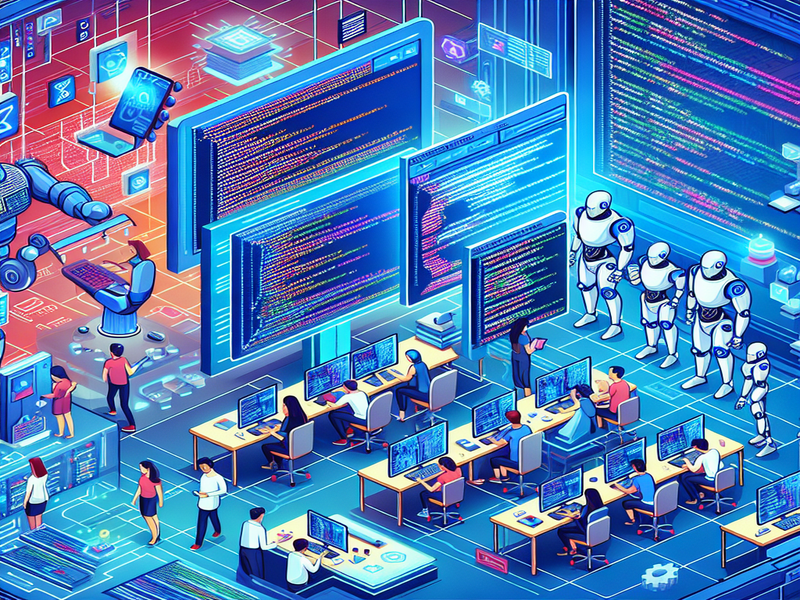- August 8, 2024
- 4 min read
Mastering the Art of Managing AI Coding Agents: The Future of Software Engineering
Introduction to AI in Software Engineering
As artificial intelligence (AI) continues to evolve at a breakneck pace, the software engineering landscape is poised for a seismic shift. The advent of AI coding agents is rapidly transforming the way software is developed, ushering in a new era of efficiency, productivity, and innovation. These intelligent agents, powered by cutting-edge language models and machine learning algorithms, are revolutionizing the software engineering process by automating tedious coding tasks and augmenting human capabilities.
The Role of AI Coding Agents
AI coding agents are sophisticated software systems that can understand natural language instructions, generate code, and even test and verify its functionality. These agents leverage the power of large language models, such as OpenAI’s GPT-3 and Google’s LaMDA, to comprehend complex software requirements and translate them into high-quality, production-ready code.
One of the key advantages of AI coding agents is their ability to handle a wide range of programming languages and frameworks. From JavaScript and Python to Java and C++, these agents can seamlessly adapt to different coding environments, making them invaluable assets for software development teams.

Moreover, AI coding agents can learn and improve over time, continuously expanding their knowledge and capabilities. By analyzing vast amounts of code repositories and developer documentation, these agents can identify best practices, optimize code efficiency, and suggest improvements, effectively acting as virtual coding mentors for human developers.
Benefits of Managing AI Coding Agents
The integration of AI coding agents into the software engineering workflow offers numerous benefits, including:
- Increased Productivity: By automating repetitive coding tasks, AI agents allow developers to focus on higher-level architectural and design challenges, significantly boosting overall productivity.
- Faster Time-to-Market: With AI agents handling a significant portion of the coding workload, software projects can be completed more rapidly, enabling businesses to bring their products and services to market faster.
- Improved Code Quality: AI agents can analyze code for potential bugs, security vulnerabilities, and performance issues, ensuring that the final product meets the highest quality standards.
- Enhanced Collaboration: By bridging the gap between technical and non-technical stakeholders, AI coding agents facilitate better communication and collaboration within software development teams.
“True coding agents, which do tasks end to end, will complement today’s AI copilots,” said Russell Kaplan, president of Cognition Labs. “This will make every engineer akin to an engineering manager, delegating basic tasks to coding agents while focusing on higher-level aspects such as understanding requirements, architecting systems, and deciding what to build.”
Future Implications for Software Engineering
As AI coding agents continue to evolve and become more sophisticated, the role of software engineers will inevitably shift. Rather than spending countless hours writing and debugging code, engineers will transition into more strategic roles, overseeing and guiding the development process.
This paradigm shift will give rise to a new breed of software engineers, ones who possess strong communication skills, domain expertise, and the ability to effectively manage and collaborate with AI agents. They will be responsible for defining project requirements, architecting complex systems, and ensuring that the AI agents are aligned with the organization’s goals and objectives.
Furthermore, the advent of AI coding agents may lead to an increase in the demand for software engineers, as businesses across various industries seek to leverage the power of these intelligent systems. Enterprises that embrace AI coding agents early on will gain a significant competitive advantage, enabling them to accelerate their digital transformation initiatives and deliver innovative products and services at an unprecedented pace.
Conclusion
The rise of AI coding agents represents a pivotal moment in the software engineering field. As these intelligent systems become more prevalent, the role of human developers will evolve, shifting towards higher-level tasks that require strategic thinking, creativity, and domain expertise.
By embracing AI coding agents and effectively managing these virtual assistants, software engineering teams can unlock new levels of productivity, efficiency, and innovation. However, it is crucial for organizations to invest in upskilling their workforce, fostering a culture of continuous learning, and promoting collaboration between human developers and AI agents.
The future of software engineering is undoubtedly intertwined with the advancements in AI technology. Those who embrace this change and harness the power of AI coding agents will be well-positioned to thrive in the rapidly evolving digital landscape, delivering cutting-edge solutions that drive business growth and success.
